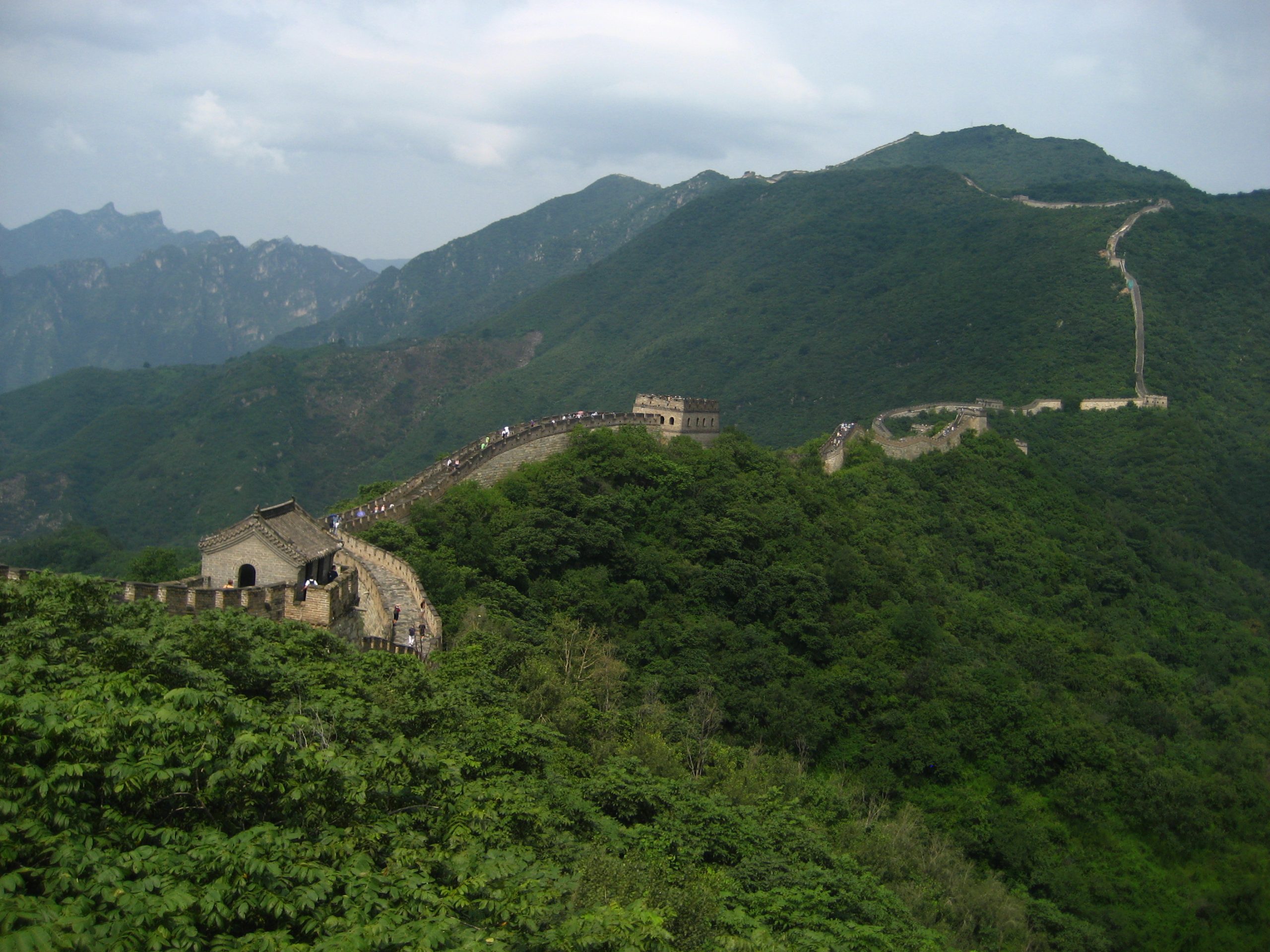
You can see a great distance from the Great Wall of China at Mutianyu. The view is quite spectacular as it winds along the crests of the mountains, rolling up and down with the terrain; the wide path at the top of the wall turns into irregular stairsteps to accommodate the undulations and is punctuated by stone guard towers. It was built centuries ago in an ultimately unsuccessful effort to defend against the dangers sweeping into the country.
I hadn’t realized that you have to make a pretty decent climb even to get up to the base of the wall, or that there would be so many souvenir stands and crowds of tourists heading to the upward path. We happily opted to take the gondola instead.
Clambering atop the wall, the crowds were less intense, and the odd beer vendor was actually welcome on a hot day. We headed away from the throng and felt a welcome rush of wind, surely related to the darkening clouds over the mountains visible far to the west. It seemed distant, but I fretted that maybe the top of the wall wasn’t the best place to be now. I finally convinced Sally that the weather was serious. The crowds had thinned and the light was dimming as we rushed back to the gondola.
Bad news—the gondola had shut down for safety due to the oncoming storm. That meant we had to find the path back down, and fast. A light drizzle had already begun, and we joined a gaggle of other tourists in the same predicament and all scurrying to find the way down. The route led back up onto the wall and then headed a few towers onward to where the path intersected.
As we rushed off, we were overtaken by heavy, wind-whipped rain which forced us into the nearest guard tower for shelter. We huddled in our improvised rain gear, now getting chilly as the water blew in through the window openings and puddled on the stone floor. We made small talk with our fellow stranded tourists and, given that this was 2008 and the Beijing Olympics were underway, the crowd was very international. We made quick friends with a couple of upbeat and burly Canadians as we waited for a pause in the downpour.
Suddenly a massive thunderclap broke over our tower shelter simultaneously with a brilliant flash of lightning, striking us momentarily dumb. That was CLOSE. We nervously waited in quiet–and then waited and waited a bit more for some abatement.
At last, the rain became less torrential, turning to a heavy steady drizzle. Sally and I had a hired driver still waiting below in the parking lot–we hoped–and were the first to head out from the tower into the wet to start the trek down. The storm had cleared out the previously crowded wall completely, and we pressed on alone to the neighboring tower which stood between us and our exit path.
We ducked into that next tower, where a similar cluster of tourists had also taken shelter and seemed to be rather casually sitting around waiting for a letup. Their tower seemed in worse repair, as I saw some stone rubble on the floor. Then Sally noticed that one of the people seemed to be injured and called me over to take a look—he was lying down in some confusion and pain and had some blood on his face, with worried friends or relatives hovering over him. As I drew near a young woman ran up from behind me and breathlessly asked was I the doctor? Why, a bit surprised, actually yes, I was a doctor—and then her story tumbled out.
She was a fifth year medical student and gave me a focused and efficient presentation as if I were an attending physician: Lightning had struck their tower—it must have been the near miss we had experienced almost half an hour before. She had tried to assess everyone already and the guard present in the tower had called for help (we were the first to arrive at their tower and she thought I was that help). People had felt what seemed like an explosion and everyone was thrown to the ground, some striking their heads, and three or four people began seizing. Many were dazed, some felt transiently blind or deaf, and others felt their arms or legs become numb. At least one person recalled his hair standing on end. The guard had required that everyone turn off their cell phones (smart phones were barely introduced then) on the theory that they might somehow attract more lightning.
The student’s name was Clara Chong. She was fluent in Mandarin and English, and she was attending medical school in London but was now home visiting friends due to the Olympics. She was the perfect heroine.
We hadn’t forseen that the journey down from the wall would become a triage scene, but here we were. Although I was trained in family practice, I was more skilled in gynecology or chronic disease than emergency medicine or mass disasters. I stretched to remember any relevant expertise and, together with Clara, we made another quick survey of the 22 injured people in the tower. Fortunately all were still alive in the short time following the strike and most were able to give some history, though many were stunned and scared, and some had minor cuts and bruises. Lightning can cause internal damage that is not immediately visible and it was impossible to assess in our situation. The rubble I had seen was blasted from the window opening where the lightning had entered, blackening the surface of the stone. The two people nearest that window were most affected—the fellow with the blood on his face, and another one who turned out to be an NBC photographer. He had no memory of the event itself, but had charred material on his T-shirt, burn marks from where his now-frozen camera had touched his leg and where a metal necklace lay over his chest. People hailed from China, the US and Scotland, including the family of a canoeist in the Games. I tried to write down contact information and relevant symptoms. There was little to do but keep people calm, somewhat warm with our donated jackets, and to document, reassess and wait.
After what seemed like far too long, official help finally arrived in the rain’s wake. It turned out to consist of a few uniformed people of uncertain training who had no equipment except a few stretchers and umbrellas and they seemed surprised to see so many people expecting assistance. They argued a bit with the guard and then started ordering everyone out. After watching them load up the Chinese fellow Sally had initially spotted with facial bleeding, and then bump him down the stairs on one of the stretchers, most people figured out a way to walk down the path instead. By now, our strong Canadian friends from the first tower had come by and were able to assist some of the weaker people down, half carrying them. Sally and I also did our best to shoulder others and slowly hobbled down the long path, trailing the evacuees. By the time we reached the bottom, most people had scattered with a few still being loaded into some waiting ambulances as Clara watched over them. The event that had shaken us deeply and briefly bonded us together then dissipated with no conclusion.
Our driver was indeed still waiting for us however, and no, we didn’t want to go the Ming tombs, we just wanted to go back to the hotel. We searched as best we could on TV or in other news for mention of the lightning strike on the Great Wall but nothing. Our plane left the next day.
Even if you can sense danger coming, you can’t always stop or avoid it; when it arrives, it can strike swiftly and the aftermath can linger. We still don’t know what the consequences were to most of the people on the wall that day, but months later, we got a surprise phone call from the Dr. Phil show. The NBC photographer had had a long ordeal in hospital, had an epiphany and married his sweetheart. He was going to be a guest on the show and had our names on a slip of paper that we had given him in case he needed it. He still had no memory of the event itself and we not only had the story, but a few pictures. Sally “sold” them to Dr. Phil in exchange for him giving thanks to all medical personnel who step in to help out in an emergency–and he did it. I would add that everyone who steps in makes a difference.


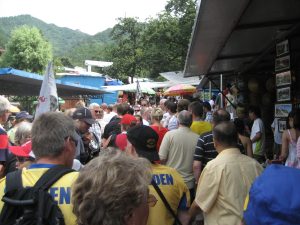
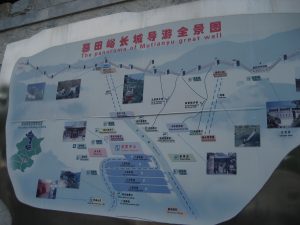
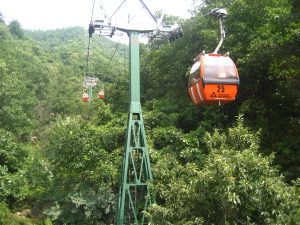
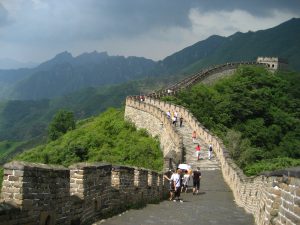
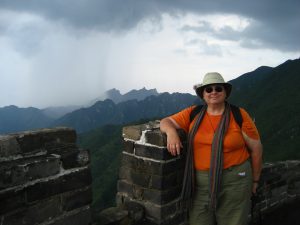
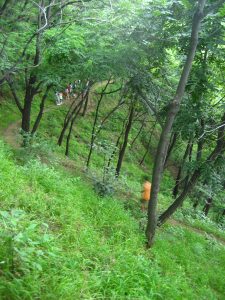
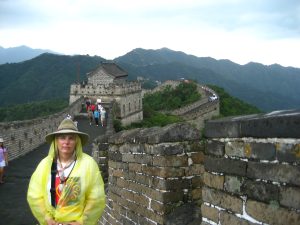
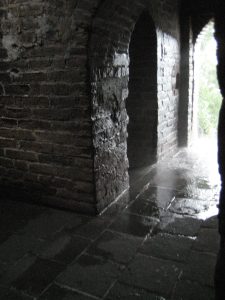
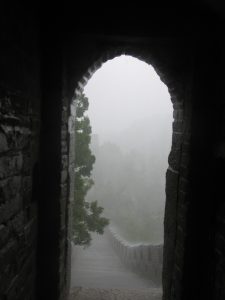
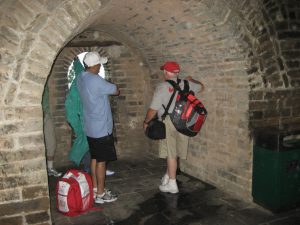
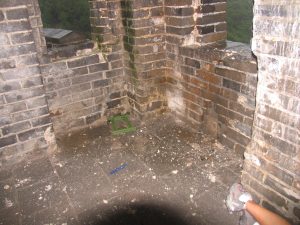
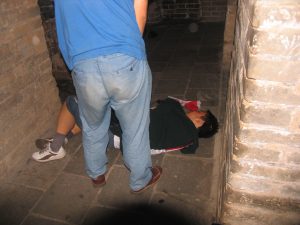
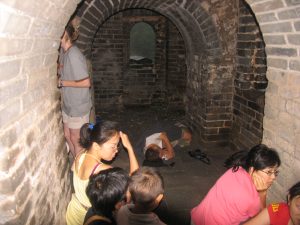
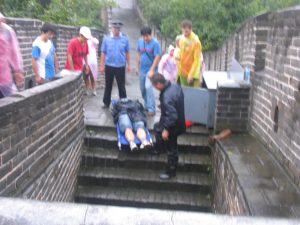
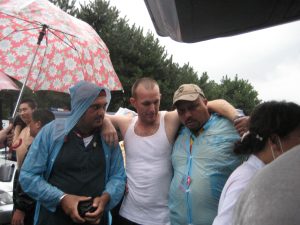
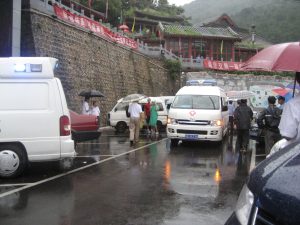
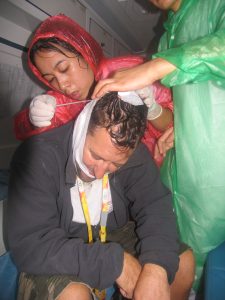
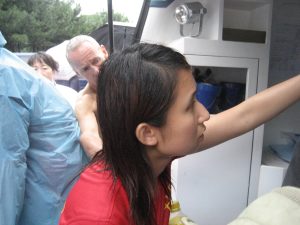

The last sentence says much!
I think that is the only way may ultimately survive as humans.
Khaki, wow I’m still digesting this story. You certainly captured this fateful journey with incredible accuracy and excellent photography to match. I’m stunned by the events, from the gondola to Clara, from the rescue to Dr. Phil.
Thank you for sharing this, I truly appreciated it.
There was a lot packed into that for sure. And more stories we still don’t know. Writing it took me back—it was fifteen years ago now—but the memory remains sharp. The hardest part was locating the pictures on an old peripheral hard drive (more recent ones live in my phone/the cloud).
Wow, what a fabulous story and a great message about people coming together. Thanks for writing it.
Glad you liked the story. It was quite the experience, both distressing and uplifting—and emotionally exhausting. So glad everyone was still alive!!! And that Clara was there to communicate and help out.
Remarkable story, Khati, from the near miss in your tower, to finding the injured party in the next tower and how you and Clara pulled everyone together and they all came down from the Great Wall to tell the tale. And you even got to share your photos and some pieces of your good work on national TV. Your humanity shines through throughout the entire, breathtaking story.
Thanks Betsy. Yes, it was quite something to experience. When I saw the prompt I knew it was the story I had to share.
Khati, what a tale and so much credit to YOU for all you did on what was meant to be a day of sightseeing!
My husband’s been to China often on business but not I. It’s on my bucket list and I hope to get to the Great Wall – but on a sunny day!
Yes, watch the weather! If you make it to the Great Wall, it is truly an amazing place though.
Your narrative has remarkable rhythm: beginning with the classical tourist reflections, to a medical drama, ending with Dr. Phil. I enjoyed the pictures. But glad there were no of the TV Doctor.
The nuanced description of the medical response suggested the problems with China’s medical service without making it the center of attention.
I enjoyed being along for the ride in your trip.
Thanks for your insightful comments. Indeed there are many tangents that could have been followed here, and I leave that to your imagination. I’m glad you enjoyed being along for the ride.
What a perfect prompt for you, Khati. Your story is riveting and the photos are amazing. The people who were injured were lucky you, Sally, and Clara were there.
Well the prompt did remind me of the perfect lighting story it’s true. Glad to have the excuse to share it.
Always love the way you illustrate your stories with your photos, Khati, and what an adventure this was, punctuated as it was by the storm!
Thanks–glad you liked the story. I did have some pictures but had to dig them up off an old hard drive. It can be a challenge!